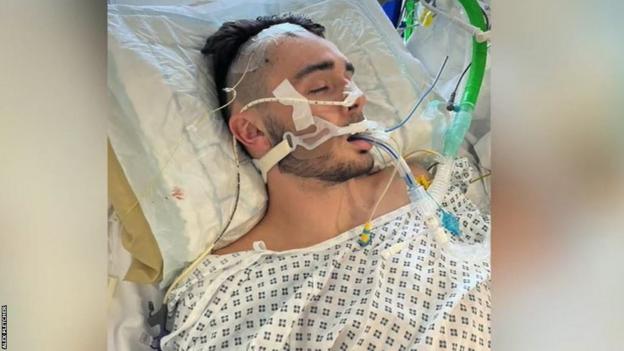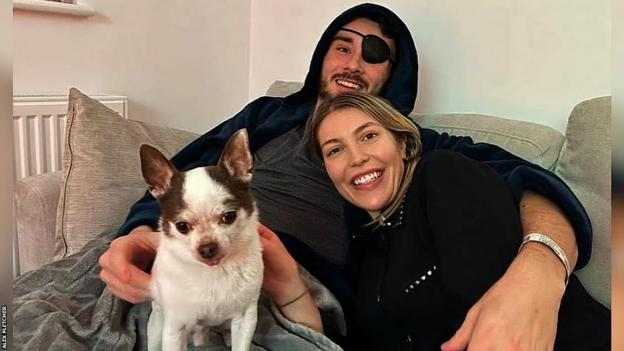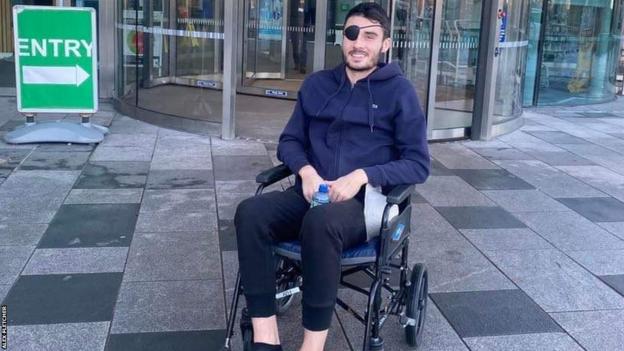
A non-league striker who fractured his skull colliding with concrete barriers next to the pitch says “my family were told if I made it I may not be the same person”.
The 24-year-old told BBC Sport he did not realise the severity of his injury until he was responsive following the coma, and during that time his family had an anxious wait.
“My surgeon gave them the news that if I made it through the surgery, which was a slim chance as it was, I might not be the same person,” Fletcher says. “I might not have use of my legs. I might not even remember my family, because of where the impact was.”
Fletcher had started the National League South match against Dulwich Hamlet at Bath’s 8,800-capacity Twerton Park. When he made a quick run down the right-hand side he was nudged “unintentionally” into the boards, which had no padding. Fletcher’s head made contact with a concrete wall the boards were attached to.
Fletcher’s fiance, Ellie Pitocco – who has been with Fletcher since they were 13 – was not at the match and drove to Bath as soon as she heard about the injury. She says the surgeon telling her Fletcher may not make it was “the worst thing I have ever been told about someone who means so much to me”.
“When I reached him he had lost consciousness and I saw him in a really, really bad way,” she says. “It was all a bit of a blur, it was an out of body experience. It was literally the longest night of my life.
“I just thought ‘this can’t be real’. I remember when he [the surgeon] told us he might not make it I just kept saying ‘this isn’t real’. I couldn’t process anything, I felt like it wasn’t me. I didn’t think it was happening to me. I didn’t think it was happening to Alex.”

Fletcher actually remained awake after he hit the wall until he reached the hospital, before losing consciousness at the hospital. As he was laying on the floor at the ground, he could hear the PA at the ground tell supporters the match had been abandoned.
He adds: “The only thought in my mind was ‘stay awake’ because it really was at that point if I didn’t stay awake then that could be it.
“The main emotion I felt was a willingness to really resolve, dig in and stay awake in all honesty. I had an over urging sense of ‘I need to fall asleep’, I felt really drowsy.
“The main objective for me at that point was to keep myself awake with the medical team and the players and manager [who were there] to see me and be with me.
“I was in the same position unable to move and unable really to communicate. I remember saying about how much my head was hurting at the time, a really overriding sense to stay with it.”
Fletcher’s surgeon said his injury was akin to that of a motorcycle accident rather than a sport injury.
He had fluid drained from his brain and during surgery had part of his skull and some vertebrae removed because of swelling to his brain. He had to learn to walk again and says he he now suffers with vertigo, a condition which influences your balance, and he is still deaf in his left ear.

In reaction to the incident a fundraising page was set up by a supporter which reached £18,000, including £500 from Taunton Town – a league rival. Fletcher adds the myriad of messages from the football world helped him and his family immensely – and one in particular stood out.
“England manager Gareth Southgate wished me all the best for my recovery,” he says. “This was also when I was out of the ICU (Intensive Care Unit), so I was more well in myself to watch that video. That really did put me in good spirits.”
The player is working with union the Professional Footballers’ Association (PFA) to try and change player safety regulation.
“I have said from day one I don’t want this to happen to anyone else,” Fletcher says. “I don’t want to see my team-mates go out onto pitches or stadiums where there could be at risk to potentially going through what I have.
“The PFA have met with the sports minister to put pressure on him to levy the FA [Football Association] to try and tighten the regulation around player safety. Not even just generally around the pitch perimeters but all around the ground.
“There is a lot of regulation around fan safety but there’s not so much consideration for the players. With the players being the most valuable asset the club will have I think it’s time we start looking at tightening the regulation and the FA start considering looking after the players a bit more.”
The PFA says the regulation needs to change as they don’t feel enough has been done and there “seems to have been a lack of clear direction given to clubs”.
Fletcher is targeting a return to football but is aware he has a long road ahead of him. He hopes to be a part of Bath’s preseason in a non-contact role and then mark a path for his return to the pitch with his surgeon’s guidance.
The next date in his calendar though is his wedding day on 28 May.
His future bride says: “I’ve tried to sit down and write my vows and it hasn’t gone very well! I feel there just aren’t words that can say how much he means to me. I think it will be a very emotional day for a lot of people.”
A spokesperson for the Sports Grounds Safety Authority (SGSA) said: “Whilst the focus of the SGSA is on the safety of fans, the safety at players is of course critical. The playing area is their place of work and, as with any workplace, their employers have a duty to ensure their safety.”
And Minister for Sport Stuart Andrew said: “Ensuring player safety is of paramount importance, at every level of football.
“Under the Health and Safety at Work Act, football grounds are required to undertake risk assessments to identify any potential issues and ensure suitable mitigations are put in place in order to guarantee player welfare.
“I have met with the PFA who shared their concerns. We continue to work with them, the FA and others to ensure football grounds carry out suitable risk assessments and that safety obligations are met.”





